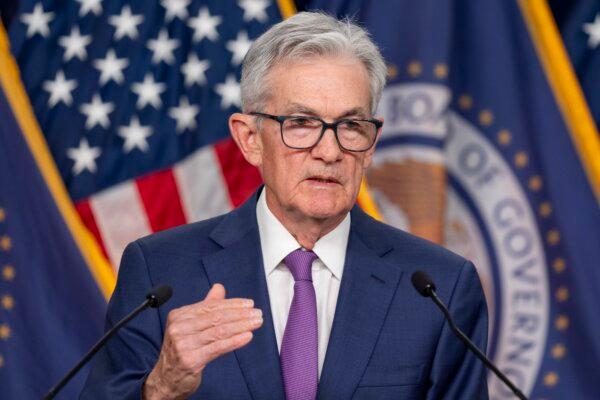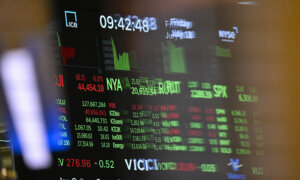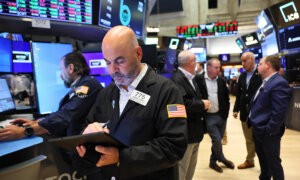Commentary
Bull markets naturally climb a “wall of worry,” and the latest worries center around escalating wars, the presidential race, and delays in Fed rate cuts. I’ll start with rising concerns over the escalation of the four-month-old war in the Middle East, since U.S. facilities in the Middle East have been attacked at least 166 times since last October. As a result, the U.S. has dramatically stepped up its attacks on Iranian proxies operating out of Iraq, Syria and Yemen. It will be interesting now to see if Iran will escalate further.
Shipping disruptions in the Red Sea are not adversely impacting the U.S., but they have the potential to keep food and energy prices high. A bigger threat to food prices comes from the European Union’s (EU’s) attempt to reform practices on productive farmland by banning chemical fertilizers and killing livestock to reduce methane emissions. These measures are putting many EU farmers under duress and many expect to go out of business, since they cannot compete against cheaper imports of agricultural products. This growing unrest started in the Netherlands and has spread to France, Germany, Greece and Portugal, fueling the rise of far-right parties, some of which want to follow Britain and exit the EU. Hungary, Italy and Ireland are also objecting to the green agenda that is mandating massive changes for EU farmers.
There is also a risk that the conflict between Ukraine and Russia could expand, as the second anniversary of that war of attrition approaches. After Ukraine bombed Russia’s natural gas pipeline and the Trans-Siberian Railway, there is still the looming threat that Russia’s crude oil pipeline could be bombed, which could send crude oil prices soaring. Ukraine’s latest major attack was a drone strike on a chemical transport facility in Ust-Luga, about 100 miles southwest of St. Petersburg. This port is a crucial location for Russia’s energy infrastructure, operated by Novatek, Russia’s second-largest natural gas producer.
With another bill to aid Ukraine under consideration in Congress, there is a growing contingent within the Republican Party that does not like the fact that there is no accounting associated with aid to Ukraine. With 177 Ukrainian generals reportedly living in luxury villas in Spain and elsewhere, driving expensive sports cars, there is obviously suspicion that many associated with aid to Ukraine are enriching themselves.
In that context, Tucker Carlson’s recent interview with Vladimir Putin struck a nerve in the intelligence community. After an exhaustive history lesson at the start of the interview, Putin made it clear that Russia was willing to negotiate a settlement with Ukraine, as well as a prisoner swap for a detained Wall Street Journal reporter. Ironically, Ukraine’s President Volodymyr Zelensky ran on promoting a peace agreement with Russia, but Britain and the U.S. apparently convinced him to change his mind.
In another potential war zone, Venezuela moved light tanks and missile-equipped patrol boats to the Guyana border. Venezuela’s Minister of Defense, Vladimir Padrino, accused ExxonMobil of relying on the American military for its security. On X (Twitter), Padrino said, “They will receive a proportional, forceful response in the maritime area that rightfully belongs to Venezuela,” adding, “The Essequibo is ours!” ExxonMobil spokesperson Michelle Gray said, “We are not going anywhere—our focus remains on developing resources efficiently and responsibly, per our agreement with the Guyanese government.”
Obviously, the border dispute between Venezuela and Guyana just got more interesting!
In the energy sector, West Virginia Senator Joe Manchin called for a Senate hearing regarding the Biden Administration’s plan to pause the expansion of LNG facilities. Specifically, Manchin believes that the Biden Administration’s pause on new LNG export approvals is unjustified and should be “reversed immediately.” According to Manchin’s written statement, he plans to use a Senate Energy and Natural Resources Committee hearing on the moratorium to cast doubt on the impartiality of the administration’s study of the effects of LNG exports on “climate change, the economy, and national security.”
The Wall Street Journal on Thursday reported that the Rockefeller family and other wealthy donors convinced President Biden to pause LNG expansion. Sarah Brennan, associate director at the Rockefeller Family Fund, celebrated the win and said in an email to environmental groups that, “The pause … is the result of a sustained four-year push that built upon years of opposition to gas exports by community groups and lawyers.” Brennan added, “The White House recognized the power (of) this campaign.”
That may seem well and good to the Rockefellers and other well-off Americans, since we do not have to worry about where our food comes from, and our energy is cheaper than in the rest of the world, but most of the rest of the world is not energy- or food-independent. Neither is America in a demographic decline, like China, which lost by 2.08 million people in 2023, or much of Europe. China’s “one child” policy and Europe’s low birthrate are coming back to haunt them. The bottom line is that the U.S. is an oasis, our consumers are much more optimistic – and presidential election years also tend to boost that optimism.
Speaking of election-year politics, President Biden is apparently furious that a Special Council described his memory as “poor” and “hazy” in dismissing charges against him. The Special Council said that Biden could not recall what years he was Vice President and when his son Beau died. Biden held an impromptu press conference and said, “My memory is fine.” However, at the press conference, Biden confused the President of Egypt with the President of Mexico, so this gaffe reinforced the perception that he may be declining mentally. Obviously, the outcome of the 2024 Presidential election has now become even cloudier.

Federal Reserve Board Chair Jerome Powell speaks during a news conference about the Federal Reserve's monetary policy at the Federal Reserve in Washington on Jan. 31, 2024. (Alex Brandon/AP Photo)
Powell Goes on “60 Minutes” … But He May Change His Tune Soon
On Sunday, February 4, Fed Chair Jerome Powell went on CBS’s 60 Minutes to reiterate what he told the financial press four days earlier, about how a March key interest rate hike was unlikely, so the first rate cut is now expected to happen May 1st. Powell said, “The danger of moving too soon is that the job is not quite done, and that the really good readings we’ve had for the last six months somehow turn out not to be a true indicator of where inflation’s heading.” Powell also said that the first rate cut “Could happen around the middle of the year,” which could refer to the June FOMC meeting. However, I am confident that inflation will continue declining and lower market rates may influence the Fed to start cutting on May 1st.
In an attempt to reinforce what Powell said on 60 Minutes, the Fed also unleashed two of its brightest Fed Presidents to meet the media. First, Chicago Fed President Austan Goolsbee told Bloomberg TV, “We’ve had seven months of really quite good inflation reports, right around or even below the Fed’s target…. So if we just keep getting more data like what we have gotten, I believe that we should well be on the path to normalization.” Then, Minneapolis Fed President Neel Kashkari wrote, “It is possible, at least during the post-pandemic recovery period, that the policy stance that represents neutral has increased,” adding that, “It gives the FOMC time to assess upcoming economic data before starting to lower the Fed funds rate.”
In addition, Bloomberg reported on Wednesday that Kashkari said that Fed officials would like to see “a few more months” of inflation data before cutting key interest rates two or three times in 2024. On CNBC, Kashkari said, “If we get to see a few more months of that data, I think that will give us a lot of confidence,” adding that, “We’re not looking for better inflation data, we’re just looking for additional inflation data that is also at around this 2% level.” Frankly, I think waiting for June would be a mistake, since inflation has been under the Fed’s 2% target rate for the past seven months, based on the Personal Consumption Expenditure (PCE) index, so the Fed should start cutting rates no later than May 1st.
Another reason that the Fed may want to cut key interest rates sooner rather than later is that layoffs are mounting, especially at technology companies. The latest example is Tesla. Elon Musk has said that high interest rates are curtailing Tesla’s sales of electric vehicles (EVs). Furthermore, the EV glut is now worldwide. The list of EV makers is long and getting longer, so Tesla now has a lot of competition.
While the Fed contemplates inflation at home, deflation is spreading around the world, especially in China, where its National Bureau of Statistics announced that consumer prices declined -0.8% in January, the biggest monthly drop since September of 2009. Furthermore, wholesale prices, based on the Chinese producer price index, plunged -2.5% in January. The U.S. is expected to continue to import this deflation from China, so the Fed should beware waiting too long to curb rates, since global deflation is spreading.
Speaking of Chinese exports, the Commerce Department announced last Wednesday that the U.S. trade deficit in 2023 declined almost 19% to $773.4 billion, the lowest level in three years. For all of 2023, imports declined 3.6%, while exports rose 1.2%, led by energy exports. Interestingly, the 2023 trade deficit with China shrank to $279 billion – the lowest level since 2010 – so Chinese tariffs continue to have a significant impact. In December, imports declined 1.3% to $320.4 billion, while exports rose 1.2% to $258.2 billion. A lower trade deficit naturally boosts GDP growth rates, too. The Atlanta Fed is now estimating 3.4% annual first-quarter GDP growth, down from its previous estimate of a 4.2% annual pace.
Overall, I hope you are as excited as I am about 2024. The economic recovery in the U.S. will be fueled by energy exports, strong consumer confidence, inventory rebuilding and productivity gains! The Presidential election will be the grand finale to the year – even though the outcome seems uncertain now. Whatever the outcome, change is usually good, and 2024 is expected to deliver lots of positive changes.
Ed Yardeni, my favorite economist, is comparing 2024 to 1999. And he has been comparing the 2020s to the Roaring 1920s. Even though the stock market recently hit new highs in the major averages, the main thing I want you to remember is that the stock market is not overvalued in the small-to-mid capitalization arena, so the rally this year could be a “launching pad” that propels our stocks dramatically higher for 2024 and beyond.
Views expressed in this article are opinions of the author and do not necessarily reflect the views of California Insider.









